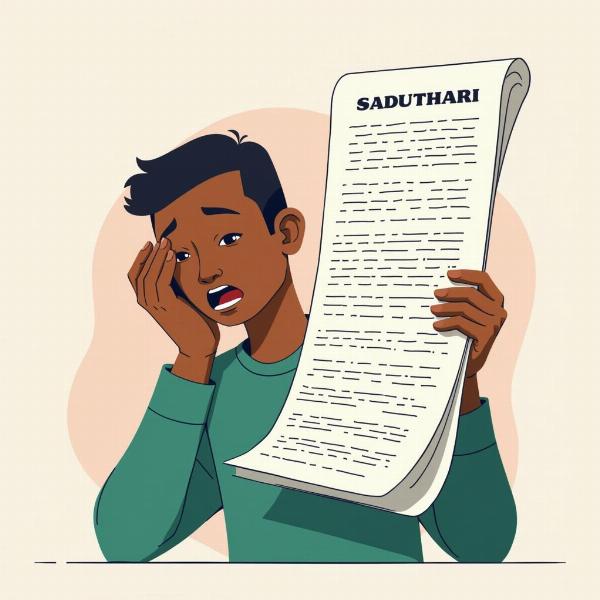Understanding the term “non-literate” in Hindi is crucial for effective communication and navigating various social and administrative contexts. This term refers to individuals who lack the ability to read and write, a condition that significantly impacts their access to information, opportunities, and overall empowerment. Finding the right Hindi equivalent is essential for conveying the intended meaning accurately and respectfully.
Understanding “Non-Literate” in the Indian Context
“Non-literate” goes beyond simply not knowing how to read or write. It encompasses the social, economic, and cultural factors that contribute to this condition. In India, a country with a diverse linguistic landscape and varying levels of access to education, understanding the nuances of this term is particularly important. “Non-literate” isn’t just a label; it’s a reflection of the challenges many individuals face in accessing basic rights and opportunities. What are the appropriate Hindi terms to describe this condition, and how can we use them sensitively?
 A person struggling to read a document
A person struggling to read a document
Hindi Equivalents of “Non-Literate”
Several Hindi words can be used to convey the meaning of “non-literate,” each with its own connotations:
- निरक्षर (Nirakshar): This is the most common and widely accepted term for “non-literate” in Hindi. It directly translates to “without letters” and is generally considered a neutral term.
- अनपढ़ (Anpadh): This term also means “illiterate” or “uneducated” and is commonly used. However, it can sometimes carry a slightly negative connotation, implying a lack of learning beyond just literacy.
- गँवार (Ganwar) / देहाती (Dehati): These terms, meaning “rustic” or “villager,” are sometimes used to refer to non-literate individuals, especially in rural areas. However, they are often considered derogatory and should be avoided.
Choosing the right word depends on the context and the audience. Using respectful language is essential to avoid perpetuating stereotypes and promoting inclusivity.
The Importance of Literacy in India
Literacy is a fundamental human right and a key driver of social and economic development. In India, promoting literacy is crucial for empowering individuals, improving public health, reducing poverty, and fostering democratic participation. Government initiatives and non-profit organizations are working tirelessly to improve literacy rates, particularly among women and marginalized communities.
Addressing the Challenges of Non-Literacy
Addressing non-literacy requires a multi-faceted approach. Providing access to quality education, especially in rural areas, is crucial. Furthermore, creating learning opportunities tailored to the needs of adults, along with promoting awareness and reducing the stigma associated with non-literacy, are essential steps. What role can technology play in bridging the literacy gap?
How Meaning-Hindi.in Can Help
Accurate translation is vital when discussing sensitive topics like non-literacy. Meaning-Hindi.in offers professional translation services that ensure accurate and culturally sensitive rendering of terms related to literacy and education. Our expertise in Hindi language and Indian culture allows us to provide high-quality translations for various purposes, including educational materials, government documents, and social awareness campaigns.
Conclusion
Understanding the meaning of “non-literate” in Hindi and using appropriate terminology is essential for respectful communication and effective engagement with this important issue. Promoting literacy is crucial for empowering individuals and driving progress in India. Meaning-Hindi.in plays a vital role in facilitating clear communication and bridging language barriers in this area.
FAQ
- What is the most appropriate Hindi word for “non-literate”? Nirakshar (निरक्षर) is generally considered the most neutral and appropriate term.
- Why is it important to use respectful language when talking about non-literacy? Using respectful language avoids perpetuating stereotypes and promotes inclusivity.
- What are some of the challenges faced by non-literate individuals in India? Non-literate individuals often face limited access to information, opportunities, and basic rights.
- How can I contribute to improving literacy rates in India? Supporting educational initiatives and promoting awareness about the importance of literacy are crucial steps.
- What services does Meaning-Hindi.in offer related to literacy and education? Meaning-Hindi.in provides accurate and culturally sensitive translation services for educational materials and related documents.
Meaning-Hindi.in is your trusted partner for high-quality Hindi translation and localization services. We specialize in various domains, including business, legal, technical, website, and educational translation. Our team of expert linguists ensures accurate and culturally appropriate translations that meet your specific needs. Contact us today for all your Hindi translation requirements. Email: [email protected], Phone: +91 11-4502-7584. Meaning-Hindi.in offers reliable solutions for all your Hindi language needs.